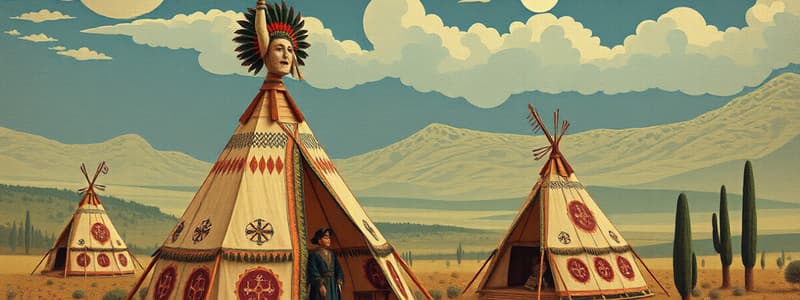Podcast
Questions and Answers
Where were Indian reservations created?
Where were Indian reservations created?
on land that was least wanted by the whites because of its infertility
Who did the government appoint to look after reservations?
Who did the government appoint to look after reservations?
Indian agents
The Indian agents were often...
The Indian agents were often...
corrupt
What often went missing because of the Indian agents?
What often went missing because of the Indian agents?
Rations were... and crops often...
Rations were... and crops often...
Diseases like... were....
Diseases like... were....
Medical care was...
Medical care was...
Why did some Indians join the Indian agency police?
Why did some Indians join the Indian agency police?
In 1871, chiefs no longer...
In 1871, chiefs no longer...
In the early 1880s, chiefs no longer looked...
In the early 1880s, chiefs no longer looked...
In 1883, Indians were judged...
In 1883, Indians were judged...
Indian children were taught...
Indian children were taught...
How were Indian children taught white American values?
How were Indian children taught white American values?
Indian beliefs...
Indian beliefs...
How did the government reduce the power of medicine men?
How did the government reduce the power of medicine men?
Who were sent in to civilize the Indians?
Who were sent in to civilize the Indians?
Why were Christian missionaries sent to reservations?
Why were Christian missionaries sent to reservations?
Indians were not allowed to hunt.
Indians were not allowed to hunt.
How did the banning of Indian hunting affect the social structure?
How did the banning of Indian hunting affect the social structure?
Indians were...
Indians were...
What were Indians originally really good at?
What were Indians originally really good at?
What did some Indians refuse to do?
What did some Indians refuse to do?
Indians could not hunt buffalo or fight because...
Indians could not hunt buffalo or fight because...
Flashcards are hidden until you start studying
Study Notes
Indian Reservations Overview
- Indian reservations were established on land deemed undesirable by whites due to its lack of fertility.
- The government appointed Indian agents to oversee the affairs on these reservations.
Indian Agents and Corruption
- Indian agents were often corrupt, leading to significant mismanagement.
- Money and rations intended for the Native American communities frequently went missing due to agent malpractice.
Living Conditions on Reservations
- Rations provided to Native Americans were generally poor in quality.
- Agricultural efforts often failed, resulting in insufficient food supplies.
- Common diseases such as measles and influenza spread easily among the reservation populations.
- Access to medical care was severely lacking and deemed very poor.
Changes in Governance and Authority
- In 1871, Native American chiefs lost the ability to sign treaties with the government.
- By the early 1880s, authority over reservations shifted from chiefs to councils.
- Legal systems changed in 1883, with Indians judged in special courts until those courts were replaced by federal courts in 1885.
Education and Cultural Suppression
- Native children were educated in white American values, which led to cultural assimilation.
- Schools enforced punishments for speaking native languages and disrespected traditional cultural practices.
- Indigenous beliefs and practices were actively banned by the authorities.
- The government targeted traditional medicine men by prohibiting feasts, dances, and ceremonies.
Role of Missionaries
- Christian missionaries were sent to reservations with the goal of civilizing Native Americans.
- This mission was part of a broader effort to assimilate Native populations into European-American cultural norms.
Impact of Hunting Bans
- Native Americans were prohibited from hunting, stripping away traditional roles, particularly for men.
- The ban on hunting affected their clothing, lifestyle, and social structure by removing essential cultural practices.
- This restriction led to a loss of skills among Native Americans, who were originally skilled horsemen, hunters, and warriors.
Resistance to Assimilation
- Some Native Americans resisted learning European farming techniques and skills such as ploughing, sowing, and reaping.
- The inability to hunt buffalo or engage in traditional fighting arose from the absence of horses, further contributing to the de-skilling of these communities.
Studying That Suits You
Use AI to generate personalized quizzes and flashcards to suit your learning preferences.




